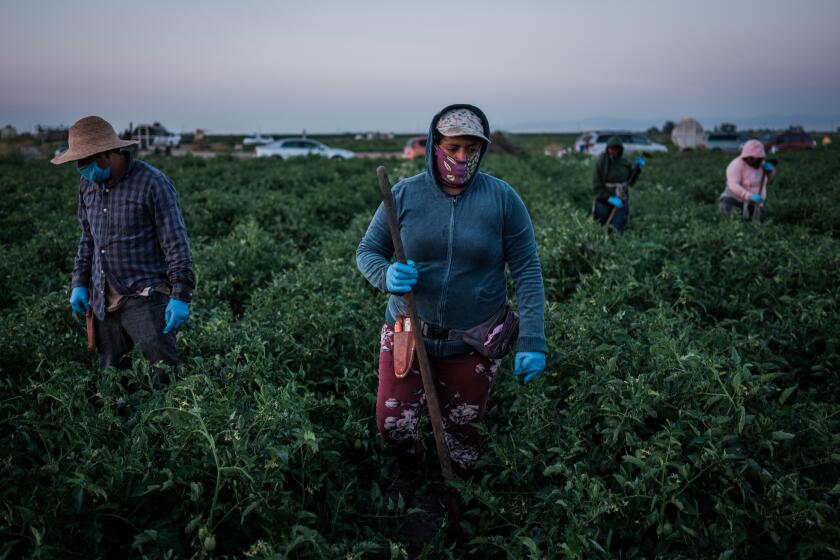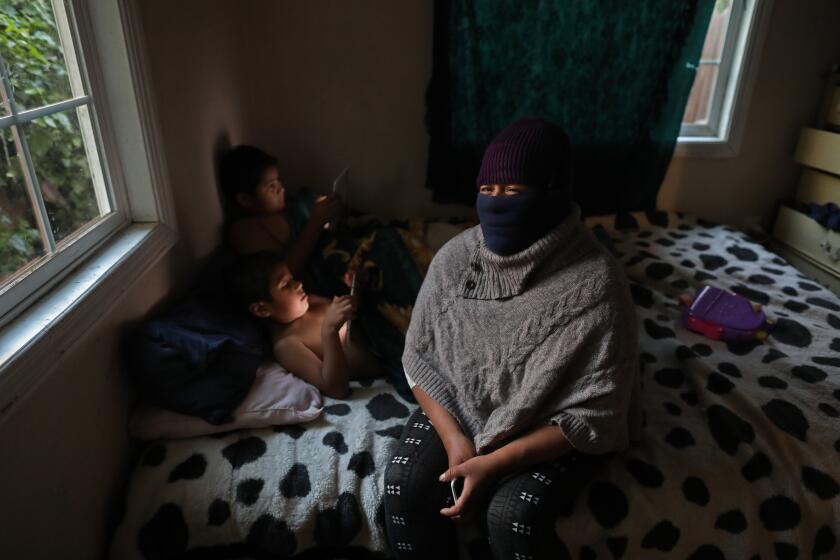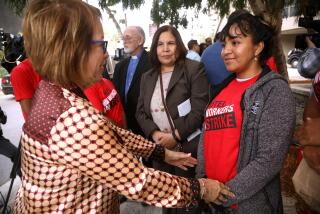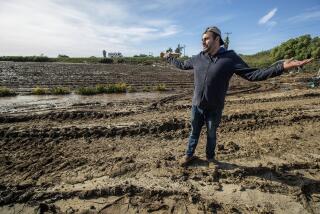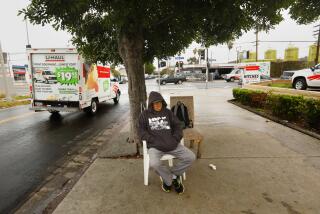These essential workers face evictions and could become homeless during pandemic
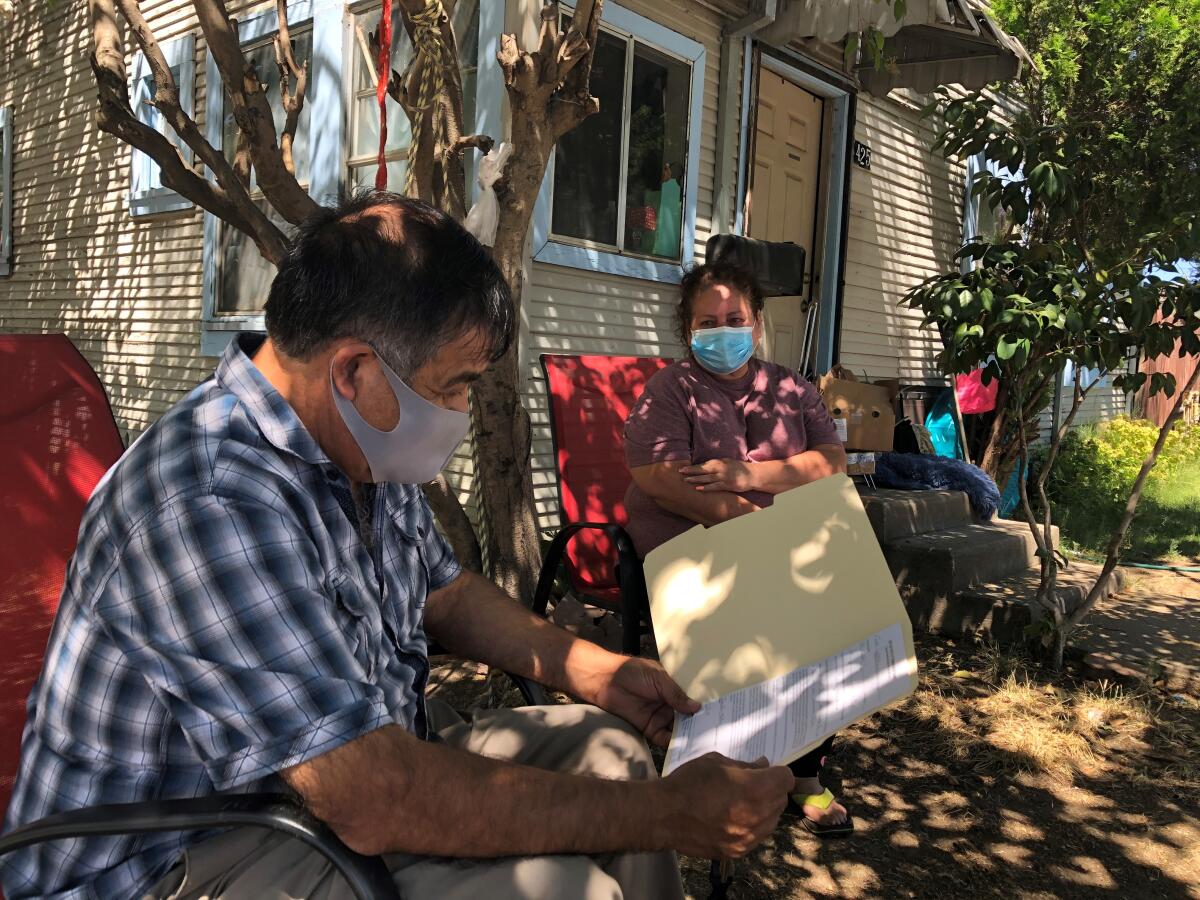
Three weeks ago on a Saturday evening, Irma Barbosa was startled by a knock on her door in this San Joaquin Valley town.
It was the landlord’s son. She was two months behind on her rent.
As she stood in the faded yellow threshold of her $300 unit, which lacks running water and is nearly entirely filled by a twin bed, he told her to be gone by 5 a.m. the next day, she said.
Barbosa speaks little English, lacks immigration documents and was panicked at the thought of being homeless within hours, she said through an interpreter. With jobs scarce because of the pandemic and while suffering from a work injury, she has been unable to return to the packing plants where she has earned a living for 12 years. Nor can she return to her off-season job at the auto parts factory where she hurt her knee while filling boxes. She had offered to pay rent in installments, but the landlord wouldn’t let her, she said.
Like many of the 1.6 million workers in California without legal status, Barbosa was uncertain of her rights and hesitant to fight the unlawful eviction. On the advice of an acquaintance, she refused to leave that Sunday morning, but she is fearful she could be forced out at any moment.
“It feels bad, but I leave it to God,” she said recently.
As California searches for ways to avoid an “eviction cliff” caused by the economic devastation of the coronavirus, including an eviction moratorium currently in place, immigrants such as Barbosa are bearing the brunt of the crisis with the least access to help, advocates say. At the same time, many are falling ill with COVID-19 while also enduring the largest wage losses amid the pandemic-triggered recession.
In San Joaquin and other rural counties, these workers often live in spaces not meant for human habitation — basement rooms with metal-grilled vents for windows, trailers parked on dirt roads that don’t exist on official maps. Barbosa’s home, she was told by a previous tenant, was originally a closet that was walled off from the main house.
They are scared that their immigration status will be used against them if they don’t comply with landlords, and they have little access to either legal advice or government aid. Federal relief funds that sent $1,200 stimulus payments to Americans excluded most of these families. Workers living here illegally are also excluded from unemployment and many other benefits, though in April, Gov. Gavin Newsom allocated $75 million in state funds meant to give up to $1,000 to 150,000 immigrants without legal status.
The state’s Judicial Council is expected Thursday to extend its eviction ban until the end of the month, preventing court-sanctioned ousters, but such safeguards are not honored in this shadow market, said Luis Magana, an advocate in Stockton who is trying to help Barbosa.
Up to 70% of new cases of coronavirus in California’s fertile San Joaquin Valley may be Latino workers, but advocates say they lack testing and access to care.
Over a 10-year period from 2007 to 2017, there were nearly 38,000 eviction cases in San Joaquin County courts, according to statistics from Faith in the Valley, a nonprofit, but the organization estimates twice that number of unofficial evictions took place during the same period.
“These are vulnerable workers that feel absolutely hopeless, that feel they have nowhere to turn,” said Assemblyman Robert Rivas (D-Hollister), who is pushing a series of bills to help farmworkers and is the grandson of an agricultural laborer himself. “These are people that stay quiet and many, as we are learning, are choosing to just self-evict, to just become homeless, to prematurely leave a property, and this is a huge problem.”
Mass displacement of immigrant workers could leave thousands of families homeless, and it probably would hammer the already-fragile labor market for California’s agricultural, construction and service industries, advocates contend, especially here in the Central Valley, where many crops are ready for harvest.
Nearly 80% of California’s workers without legal status are in jobs deemed essential, according to a UCLA study released Monday, and on average these laborers lost 25% of their wages between February and April — more than any other demographic of employees. Workers living in California illegally make up about 9% of the total workforce and had the highest rate of unemployment between February and May — nearly 30% — of any group in the study.
Farmworkers have long lived in overcrowded conditions. With the spread of coronavirus, Monterey County is taking action, but vegetable pickers still face a shortage of housing.
“The gross injustice of how we treat immigrants has become very clear, not only from a moral point of view but from an economic point of view,” said Raúl Hinojosa-Ojeda, an associate professor of Chicana and Chicano Studies at UCLA and author of the study.
If the state hopes to reopen its economy, it will need these workers, he said. “You are not going to be able to get them back if you have basically created a poverty situation where they are going to disappear.”
One of those uncertain of her economic future is Maria, a farmworker in the Merced County town of Dos Palos who asked that her last name not be used because she is in the U.S. illegally. Her husband, Israel, has worked at a dairy for nearly 10 years, with the dairy owner providing a free trailer for the family to live in and a salary of about $450 a week.
Falling milk prices from the downturn forced the dairy owner to close, and a new operator has taken over, she said. The new landlady is demanding they either leave by the end of the month or pay $650 rent and a deposit.
The landlady gave Maria a rental agreement written in English, which she can’t read, but which includes a provision that says the landlady must be informed in writing if the family is away for more than seven days and can evict them if they are gone for more than two weeks with any rent outstanding. Maria said the new landlady explained she would also keep the family’s possessions if they were evicted.
“I am not too sure exactly how it says it, but that is how I understood it,” Maria said. “I think that she’s probably in her right to demand what she wants because she is the owner.”
Maria, who is currently picking grapes for work, has two children ages 5 and 10 and sometimes must travel with them for weeks at a time to other places as different crops need harvesting. Israel just started a construction job in the Bay Area last week. She can’t find another rental they can afford but is also scared to stay under the new terms, she said.
“I understand that I would be paying $1,200 or maybe more to find a house anywhere else,” Maria said, adding that many others are in a similar situation. “So I really want people to see that somebody needs to do something to lower the rent.”
Janine Nkosi, a sociology lecturer at Cal State Fresno, said arrangements like that of Maria’s family in which a home is tied to a job are common for farmworkers. “Once they lose their employment, they lose their housing,” Nkosi said.
Jamaican farmer Earl Edwards died Friday in quarantine housing for foreign laborers in Washington state, where he worked in a cherry-packing facility. A coronavirus outbreak at one of Washington state’s largest fruit farms has renewed concern for agricultural workers, who live and work in close quarters.
Though the majority of Latino essential workers are renters, the economic crisis is threatening even those who have purchased homes. Norma Arias, 59, worked as a waitress nearly her whole life, saving enough for a down payment on a home in Taft in 2008. She liked that the home had a wraparound porch and new carpet that kept the rooms warm at night.
In 2013, just after returning home from a shift, she suffered a stroke that left her paralyzed on one side and in a wheelchair. Her son, Samuel, a farmworker, has been living with her, helping to pay the mortgage. But a rainy season followed by the coronavirus outbreak has left him with few hours in the almond orchards. They are now three months behind on the mortgage, and the bank is threatening foreclosure in August if they do not pay $4,000, Arias said.
Though she said she has tried asking the lender for help, she is overwhelmed by the process — she has no car, and even making copies of papers to send to the bank involves a long journey in the wheelchair.
“I am stressed and fearful,” she said, adding that she and her son have nowhere to go if they lose the house.
For many farmworkers, the eviction threat looms largest if they contract COVID-19, can’t work and lose wages.
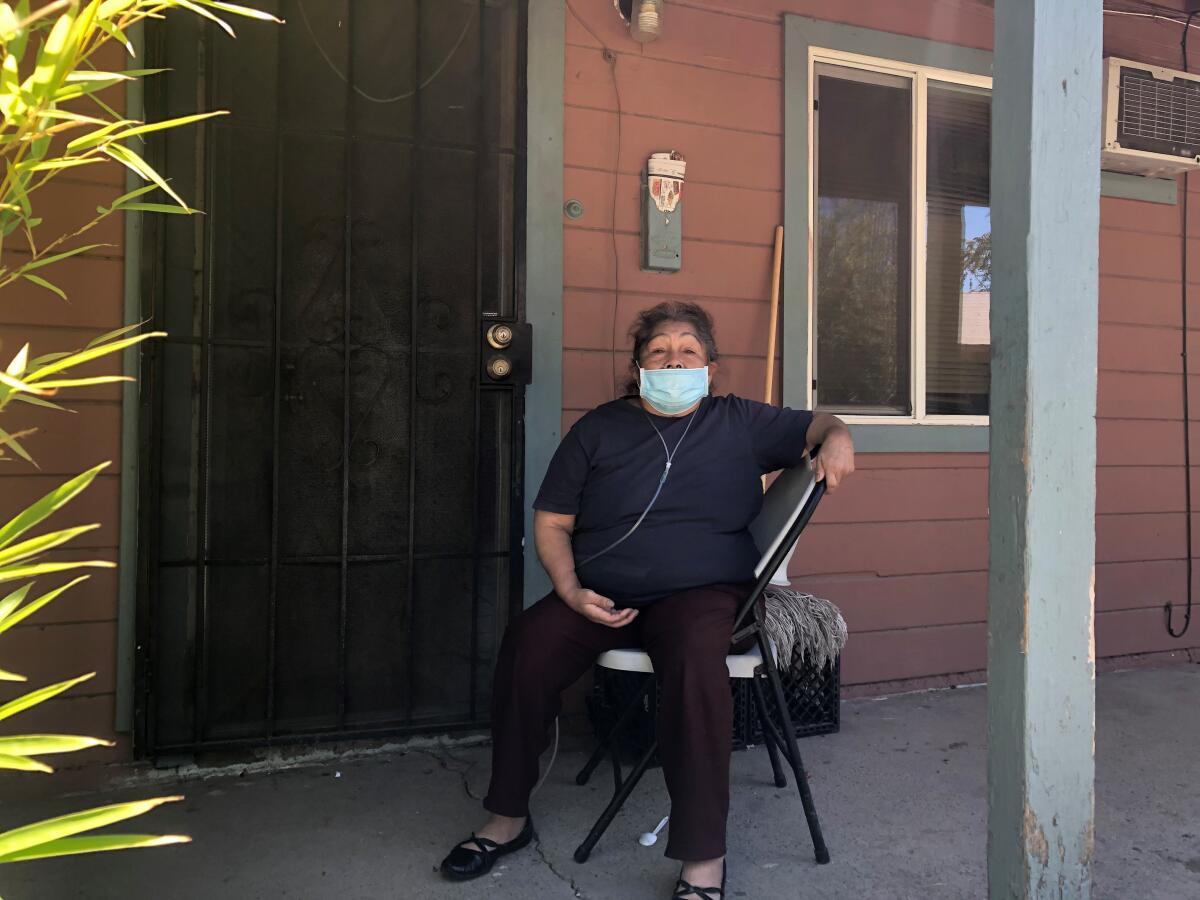
Josefa Castillo, 63, came down with the disease in July; she believes she was infected while riding in a crowded van to a farm in Napa. She has no family to help her and became so sick that her landlady called an ambulance for her. Though she is recovering, she has been unemployed for about a month.
Her biggest worry, she said with a simple one-word answer, is dinero, money. Sitting under a narrow overhang at the front door of her apartment with an oxygen tube around her neck, Castillo said she does not know when she will be able to return to work or how she will catch up on her rent, already overdue.
Imelda Garcia, 44, lives a few blocks away with her two kids and has worked with Castillo this summer. A single mother, she said she is terrified of what will happen to her children if she falls ill and can’t pay her $600 rent. A few weeks ago, her children’s uncle, a carwash worker, died of COVID-19.
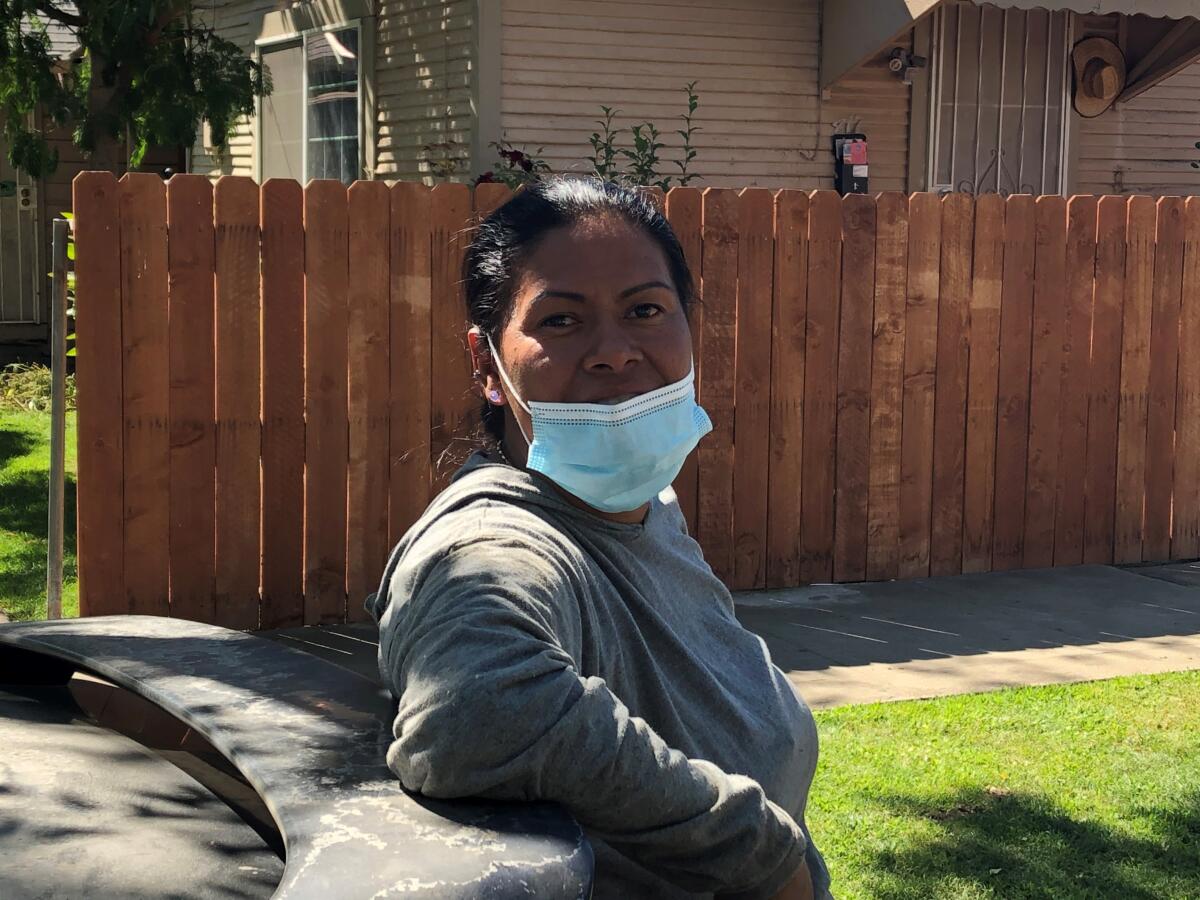
Though she hoped her 17-year-old son would attend junior college this fall, she is taking him to the fields with her instead so he can learn the work “in case I die,” she said. Right now, she is clearing brush in blueberry fields with a crew that has agreed to socially distance in their personal lives to protect one another, but she fears what conditions will be like in her next job, wherever it may be.
She shrugs in resignation when asked what kind of aid would be most useful to her, what government could do to support essential workers during the pandemic. She does not believe there is or will be protection for families such as hers that lack legal status.
“Who will help?” she asked, as if it was a rhetorical question.
More to Read
Start your day right
Sign up for Essential California for news, features and recommendations from the L.A. Times and beyond in your inbox six days a week.
You may occasionally receive promotional content from the Los Angeles Times.
